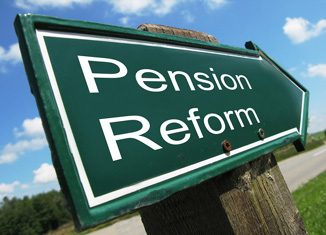New rules that radically effect how pensioners use their pot came into effect on 27th of March this year. As a result, all restrictions on access to your pension pot will be removed from April 2015, with the tax owed when withdrawing a pension fund cut to your personal rate. This will make it easier to use your entire fund as you wish and the changes affect anyone saving into a personal or workplace pension scheme, where pay-outs are based on the performance of the fund rather than final salary.
Generally, if you are over 55 and you have up to £30,000 in your pension, you will be able to withdraw the full amount from your pension, as the total amount that can be taken as a lump sum has increased from £18,000 to £30,000. However, from this amount only 25% will be tax-free, while the remainder attracts income tax at your personal rate. This is one of the biggest changes as the average pension pot amounts to around £30,000, and many people are expected to take advantage of this new flexibility.
There are restrictions on withdrawing from larger pension pots but these will fade away in April next year when savers will be able to access the entirety of their pension at any time after age 55, subject to income tax at marginal rates on three-quarters of the money.
 The ability to take the whole pension as one lump of income would mean someone with a £100,000 pension could take £25,000 tax-free and then withdraw the remaining £75,000 to spend or invest as they saw fit. However, the £75,000 would be treated as income for that tax year, pushing the individual into the higher-rate tax band for the year.
The ability to take the whole pension as one lump of income would mean someone with a £100,000 pension could take £25,000 tax-free and then withdraw the remaining £75,000 to spend or invest as they saw fit. However, the £75,000 would be treated as income for that tax year, pushing the individual into the higher-rate tax band for the year.
The alternative will be to take the money in annual lump sums as from next year income can be varied to stay within the basic rate tax or even nil-rate threshold for the year if desired.
However, the millions of savers who have purchased an annuity already will be tied to that contract so they will be trapped in the old system.
Will it lead to more pensioners becoming landlords?
Considering that the average amount of money in pension savings is only £30,000, which is six times less than the average property price in the UK, it is unlikely that buy-to-let will see a massive uplift.
The big concern for a pensioner that would rely on their pension to eat and pay their bills would be a long void period or worse still a sitting tenant to deal with. Considering that a typical pension pot is £30,000, if they did want to become a landlord they would either have to buy a property with cash in the type of area where voids/sitting tenants are most likely, or get a mortgage, which means they would be losing money if the property was unlet.
If a pensioner were fortunate enough to have a large pension pot of £150,000 for example, they would be taxed on £112,500 of it – £31,865 of it at 20% and the rest at 40%, giving a total tax bill of £38,627 and leaving a net £111,373. How many pensioners are desperate enough to buy a property that they will give over 25% of their pension to the tax man?
Even if a pensioner is determined to buy a property with their pension, they need to be aware that many mortgage lenders have a maximum age limit, which could reduce the choice of loans available, the length of the term and the interest rate offered.
Let to buy?
Considering the dire straits that many southern European countries are in, with unemployment rates in excess of 20% in Spain and Greece for example, there is a strong likelihood that property prices will fall further in ‘a place in the sun’. If that happens many UK retirees might decide to rent out their own UK home and use that as an income then use their pension pot to buy a property in a warmer country.
According to World of Expats, this year could see an increasing number of British people buying property overseas thanks to the recent announcement on pensions.
“The Chancellor’s pension reforms will make it easier for people to retire and buy property abroad,” says Nigel Ayres, founder and CEO at World of Expats. He adds: “When you add to this the equity many have built up in their homes, they will be well-placed to take advantage of the low prices that remain in many European markets.”
A likely solution for many emigrating pensioners that might be concerned about void periods or bad tenants in their UK property would be to let their home to one of their children at a reduced rent.




















